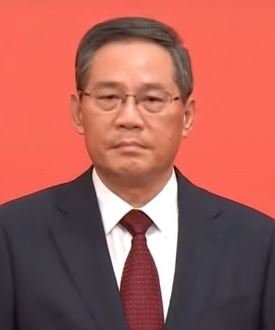Beijing: China’s new Premier Li Qiang Monday said achieving the five percent GDP target for the slowing down economy is not an easy task for the world’s second-largest economy and requires redoubled efforts but assured the country’s tattered private sector better environment to boost growth.
Li Qiang, the long-term aide of Chinese President Xi Jinping who succeeded Li Keqiang, in his first press conference, drew on Chinese folklore to demonstrate the country’s resilience in the face of difficulties but concedes the economy faces challenges.
He acknowledged that achieving the 2023 gross domestic product (GDP) growth target of around five percent for this year on the current high base of China’s economic output is not an easy task and requires redoubled efforts.
Playing down the importance of GDP, he said most people do not keep their eyes on GDP growth all the time.
China, the world’s second-largest economy, last year reported a three percent GDP, the lowest in decades and the target of about five percent set for this year by Li Keqiang in his work report March 5 is also the lowest in recent years.
What people care more about are the things that happen in everyday life like housing, employment, income, education, medical services, and the environment, Li said.
He also pointed to signs of improvement, saying the economy will break through the wind and waves and sail towards a brighter future as China’s development is supported by multiple advantages, including a vast market, a complete industrial system, abundant human resources, solid foundation for development, and institutional strength.
The government will step up efforts to foster a business environment that is market-oriented, law-based and internationalised, treat companies of all types of ownership as equals, and protect the property rights of enterprises and the rights and interests of entrepreneurs in accordance with the law, Li told a press conference.
Commenting on China’s crackdown on business during the past few years, including on e-commerce giant Alibaba and tech companies besides the detention of a star banker Bao Fan for questioning has created a fear psychosis in China’s private sector, Li said the government’s commitment to the development of the private sector is unequivocal and steadfast.
He said discussions and rumours that Beijing does not support private entrepreneurs are “inappropriate”, and that policies on the private sector have always been consistent.
He reiterated China’s commitment to protecting private entrepreneurs and creating a level playing field and highlighted new opportunities.
On the deteriorating China-US ties, Li termed the talk of “decoupling” of the world’s top two economies as just hype.
He noted that there are some people in the United States who have been trumpeting decoupling with China in recent years.
“But I wonder how many people can truly benefit from this kind of hype,” Li said. Li noted that two-way trade between the two countries had amounted to a record high of nearly $760 billion.
“China and the US are closely intertwined economically, and both have benefited from the other side’s development,” he said.
“Encirclement and suppression are in no one’s interests,” he said.
On China’s worsening demographic crisis due to falling birth rates and an increasingly old age population, Li said China has nearly 900 million working-age population and 15 million people join the workforce annually, he noted.
“When assessing demographic dividend, we shall not just look at the sheer size of the population but also look at the scale of the high-calibre workforce,” he said.
More than 240 million people have received higher education in China, and the average length of education received by newcomers into the workforce has increased to 14 years, he said.
On concerns over unemployment due to the economic slowdown, Li said China will continue to pursue an employment-first strategy and increase government support to boost job creation, noting that this year China expects a record high of 11.58 million college graduates entering the workforce.
Such a large number certainly adds pressure to employment, he said.
“But if we look at it from a development perspective, it is a good thing, because with so many young people entering the workforce, they will inject energy and vitality into our society,” he said.
Li also stressed the importance of economic stability this year saying that a slew of policy combinations will be introduced for the macroeconomy, to stimulate demand and investment, as well as reform and innovation, and to prevent risks.
PTI
